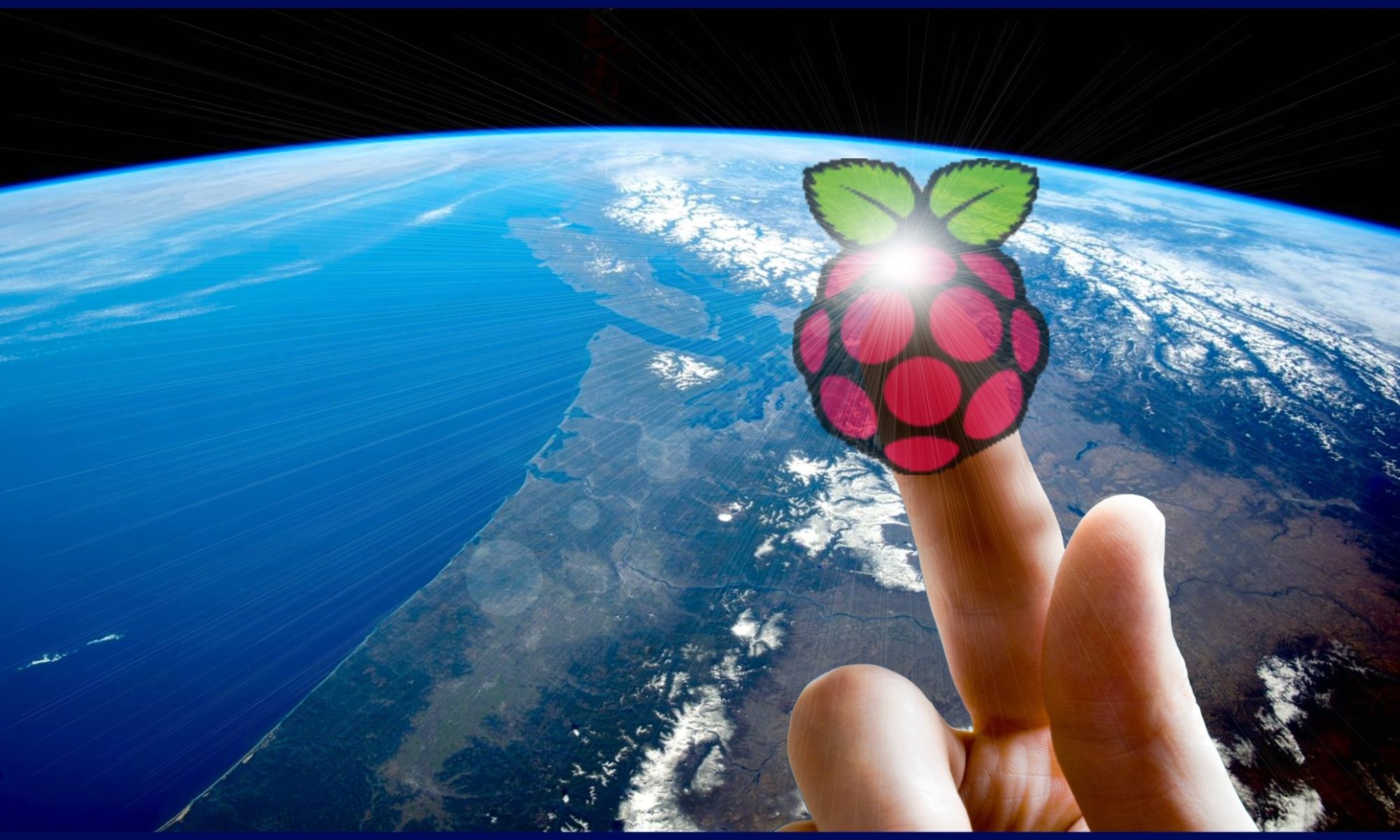Suite 303 771 Vernon Ave, Victoria, BC (map) Another in the excellent series of Python Tutorials by Simon. He will enlighten us on Python Decorators, and tell us more about building GUI python applications with TK.
April 8, 2017 – File Systems on the Pi
The Basics of Filesystems on the Pi
-
9:30 AM
Victoria Computer Club
85A Burnside Rd West (at Wascana), Victoria, BC (map)
Filesystems is what keeps track of the files on your Raspberry Pi. Linux supports several types of filesystems (including the ones used by Macintosh and Windows).
Chris K. will cover the basics of filesystems in the context of the Pi. We will look at the boot sequence, types of filesystems and their specific usages, and then we will dive into the structure of the both the boot and root filesystem (rootfs) partitions.
March 25, 2017 – Python Webservers
Python Webservers
-
Saturday, March 25, 2017
9:30 AM
Hayward will be talking about Python Webservers. The presentation will cover the basics of what they are, how they differ from a traditional web server, and provide examples of (and discussion around) some projects that he has setup using a python web server.
Presentation material is here.
http://hayward.peirce.me/python-web-framework-presentation/
March 11, 2017 – Intro to I²C on the Pi
Introduction to I²C on the Pi
-
Saturday, March 11, 2017
9:30 AM
Location: Victoria Computer Club
85A Burnside Rd West (at Wascana), Victoria, BC (map)
I²C. A common 2 wire bus, a brief background on how it works, and simple programming the Pi to read from and write to I²C devices on the bus. Devices include: External LCD display, 7 segment LEDs, and Addressable LED lights to name a few.
Join us and learn how to drive the I²C (pronounced eye-squared-see) from your Raspberry Pi.
February, 25, 2017 – Python 6: String Formatting – tkinter
Saturday, February 25, 2017
9:30 AM
Why invent the wheel? Over the years Python has adopted of features from other languages, skillfully designed and proven useful and effective:
Two Python mini-languages: regular expressions, and string formatting.
As a plus an intro to Tkinter, the built-in Python GUI. Tkinter is a binding to Tk, one-half of the Tcl/Tk language, developed over the last 25 years.
February 11, 2017- IPv6 Part 1
The future of the internet, Introduction to IPv6
- Victoria Computer Club
- 85A Burnside Rd West (at Wascana), Victoria, BC (map)
The internet has run out of IPv4 addresses (as of Oct 2016). The future of the internet and networking will rely on the “new” IPv6 protocol.
There’s more to IPv6 than a really big address. Come and learn the basics of this foundation of the next generation Internet.
We’ll cover:
• Why do we need IPv6?
• Not your Grandmother’s IP
• IPv6 Addressing
• Hands on session (Please bring a computer for the hands on session: Pi, Laptop, BSD machine)
Resource: Craig Miller
January 28, 2017 – ESP8266
9:30 AM
-
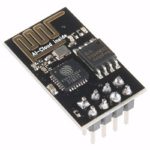 The VicPiMakers and Others, includes many devices besides the Raspberry Pi. At this meeting, Greg, will provide an over view of the ESP8266 is a low-cost Wi-Fi chip with full TCP/IP stack and MCU capability. He will highlight several different modules and dev boards, and the software options of Arduino code, and MIcroPython. There will also be a hands on session with the ESP devices.
The VicPiMakers and Others, includes many devices besides the Raspberry Pi. At this meeting, Greg, will provide an over view of the ESP8266 is a low-cost Wi-Fi chip with full TCP/IP stack and MCU capability. He will highlight several different modules and dev boards, and the software options of Arduino code, and MIcroPython. There will also be a hands on session with the ESP devices.
January 14, 2017 – Blinky Lights on BSD
Blinky Lights on BSD (Beaglebone Black)
Saturday, January 14, 2017
9:30 AM
Victoria Computer Club
85A Burnside Rd West (at Wascana), Victoria, BC (map)
If you ever had questions on how to integrate multiple devices together with 21st century security all controlled via a simple (looking) Android App, you won’t want to miss this meeting.
Join us for a similar but different demonstration of controlling LEDs running on one of the “Others” (a Beaglebone Black) using SSH and BSD. If that wasn’t enough, Mark G will also be showing a Raspberry Pi camera used to confirm that state of the LED, all under the control of a custom Android App.
See the full project here.
December 10, 2016 – A Christmas Tree
Tis the season, a Christmas tree with lights and music controlled by an Arduino!
-
Saturday, December 10, 2016
9:30 AM
-
Victoria Computer Club
85A Burnside Rd West (at Wascana), Victoria, BC (map)
-
A 14 inch by 10 inch Christmas tree which uses a music shield, a
neopixel ring (the treetop ornament), and a string of neopixels
(the tree’s lights). http://vicpimakers.ca/projects/arduino-projects/welcome-to-an-arduino-christmas/
November 26, 2016 – Analogue Inputs
Analogue Inputs on the Pi
-
Saturday, November 26, 2016
9:30 AM
-
The Raspberry Pi has 30 GPIO pins, but none of them are analogue inputs. At this meeting, we’ll take a deeper look at how to take an analogue signal (like temperature) and connect it to the Pi, and access it via Python.
November 12th Meeting: IoT Streaming
Raspberry Pi and IoT Streaming
The Internet of Things (IoT) is a hot topic. Join us, as we continue to explore the vast world of IoT using the Raspberry Pi. This weeks session will focus on IoT devices streaming data over the internet.
Saturday, November 12th, 2016
9:30 AM
Victoria Computer Club
85A Burnside Rd West (at Wascana), Victoria, BC
A full writeup for this presentation is available on the presenters website.
October 22, 2016 – Python 5: Exceptions
Python provides for the raising and handling of exceptions. An exception is used primarily for managing an error situation but is also handy in other circumstances e.g. an exception is used internally to end loop iteration.
A full writeup for this session is available here.
Saturday, October 22, 2016
9:30 AM
Q-College
Suite 303 771 Vernon Ave, Victoria, BC
October 8 Meeting: Raspberry Pi and the Internet of Things
Raspberry Pi and the Internet of Things
The Internet of Things (IoT) is a hot topic. Join us, as we explore how to connect the Raspberry Pi to the IoT, and then monitor it via the Cloud.
Saturday, October 8, 2016
9:30 AM
Victoria Computer Club
85A Burnside Rd West (at Wascana), Victoria, BC
A full writeup for this presentation is available on the presenter’s website.
September 24, 2016: Python 4: Input and Output
Introduction
Welcome back to the Python presentations!
It’s been a while so first a short(ish) recap of the previous 3 presentations, including in more detail the Input And Output section of session 3. Then I’ll discuss some useful Python Tutorials. And finally, we can go on to cover some further aspects of the language.
Simon Bluck
Find tutorial material here: Python Session 4
September 10th, 2016 Meeting
Controlling the World from a Web Browser
A presentation on how to use the Raspberry Pi (and a web browser) to control the world (or just about anything in it).
9:30 am
Victoria Computer Club
85A Burnside Rd West (at Wascana), Victoria, BC
July 9th Meeting
Serving The Web With A Slice Of Pi
Although small in size, the Raspberry Pi and other embedded Linux boards can be used as very capable web servers.
Instructor Don Woods will show you how to set up a Web server on a Raspberry Pi and get around the little snags to be able to access your Pi from outside your local network.
The entire tutorial is available here:
http://piserver.vicpimakers.ca/
Note: This will be our last Meetup before the summer holiday season. We will reconvene in early September. Have a good summer, y’all!
June 25th Meeting
Low-cost High-quality PiFi Audio
Presented by Stuart Hertzog
Tired of iTunes? Time for PiTunes! — HiFi audio from your Pi.
You don’t need a PC or laptop to enjoy listening to hifi audio from your personal collection or Internet streaming. And you won’t have to endure the convoluted iTunes interface.
A low-cost Digital Audio Converter (DAC) or DAC and Amplifier such as offered by HiFiBerry or IQAudio will turn any Raspberry Pi2 or 3 into a low-cost and energy-efficient MPD audio server controlled from a Web browser or an iOS/Android app.
Join us as instructor Stuart Hertzog explains how to set up a DAC on your Pi and demonstrates the free and open-source Linux audio software PiMusicBox, Volumio, RuneAudio, and MoOde Audio.
Discover PiFi audio and a world of listening pleasure!
Check out the links for this presentation:
June 11th Meeting
Pi Weather Station Part 1: Temperature and Humidity
Instructor Deid Reimer will demonstrate how to:
- Measure temperature and humidity with the Pi
- upload the information for display to a web server and
- display the information in text and graphical form.
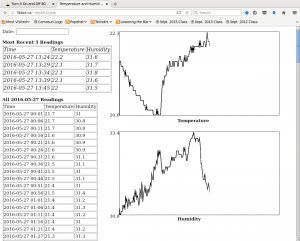
May 14th Meeting
Using the GPIO Pins on the Pi – Part 2
By Deid Reimer
This meeting we’ll pick up on the Pi GPIO pins (Part 2), looking at input, using switches (push buttons). You’ll learn how to not only have your Pi illuminate lights or close relays, but also to take input via GPIO. Using the input and output GPIO capabilities of the Pi, one can create a home automation system, or even replace your “Nest” thermostat with the Pi.
Bring your Pi and get hands on help after the presentation.
April 9 Meeting
VNC on the Raspberry Pi
by Craig Miller
In this meeting we’ll learn:
- What is VNC
- Why would you want to use VNC?
- Basic Networking
- VNC Server, VNC Client
- Other remote GUI methods, X-Windows
- Demo
Bring your Pi if you have one so you can set it up for VNC access as the presentation progresses.
Outline
- What is VNC?
- Why would you want to use VNC?
- Basic Networking
- VNC Server, VNC Client
- Other remote GUI methods
Read the Presentation
March 26, 2016: Python 3: Strings, Loops, Functions and db
9:30am Victoria Computer Club
Instructor Simon Bluck continues his popular Learning Python series, this time with an in-depth look into functions. Invaluable to people who are just getting into or who wish to deepen their understanding of this popular programming language.
See tutorial material here.
March 12 Meeting
Building An Arduino Obstacle Avoidance Robot
by Eileen Amirault (with a little help from Cody Gregory)
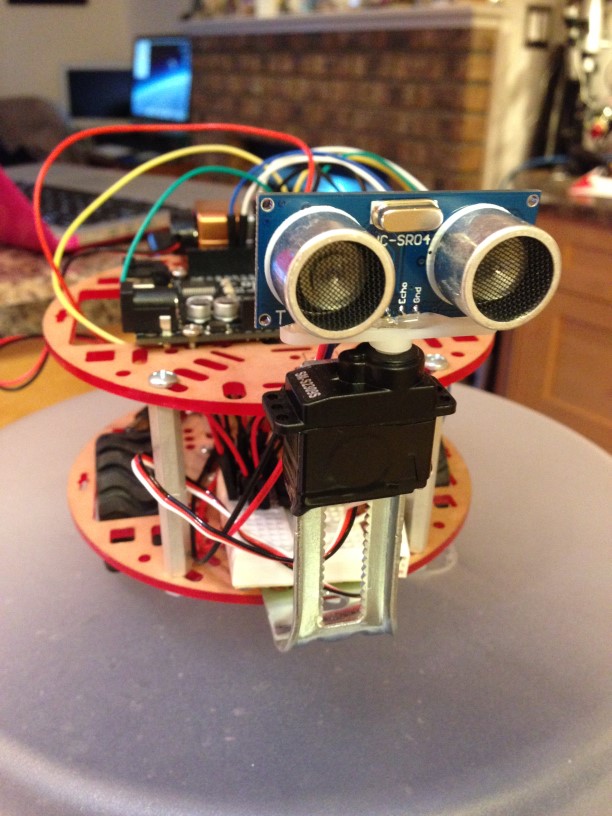
Last March Break, I read a book that changed my life. I immediately ran out and purchased an Arduino. A Raspberry Pi was not far behind. After a few months of experimenting, and watching YouTube videos of kids building Obstacle Avoidance Robots (OAR), we thought it looked like a good first project. We call it Bobby OAR. An OAR is an autonomous robot that rolls around and avoids obstacles by using sensor input. Then, based on programming, finds an alternate path forward, avoiding obstacles along the way. We had most of the components from various kits, so only a chassis and wheels needed to be ordered. Or was there something else?
February 27, 2016 – Python 2: Basic Constructs
This Python Course covers what is useful to know so you can quickly and easily set about writing Python programs. (Detailed Python programming will be covered in subsequent courses.) This course is suitable for anyone, from those that may have very little computing/programming experience, to those who have already been actively programming in Python. The aim is to get everyone up to the point where they feel confident in using Python and writing useful programs.
Simon Bluck
See tutorial material here.
February 13 Meeting
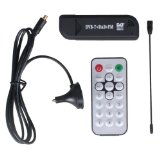

A Live Flight Data Feeder
Presented by Gordo
One of the many cool things you can do with your Raspberry Pi is to add a special $30 DVT-T USB dongle and install some software to turn your Pi into a live flight data feeder for FlightRadar24.com and FlightAware.com.
The recommended one is an ADS-B USB Dongle (R820T), which includes a small indoor antenna, but I purchased an equivalent one from Amazon at a very reasonable cost.
Among the benefits of this project are gaining free premium memberships with both sites; the ability to monitor flights overhead in real-time; and learing a bit about how to install third-party software via the command line.
In this presentation, I will give an overview of the hardare and software required and perform a quick walk-through installing the FlightRadar24.com feeder. If time permits, I will also demonstrate installing the FlightAware.com feeder.
Since these feeder stations are location-dependent, you will have to perform your own install at the place from which you’ll set up your Pi feeder and antenna.
Place: Victoria Computer Club, 85A Burnside Rd West (at Wascana), Victoria
Time: 9:30 a.m. – 12:30 p.m.
